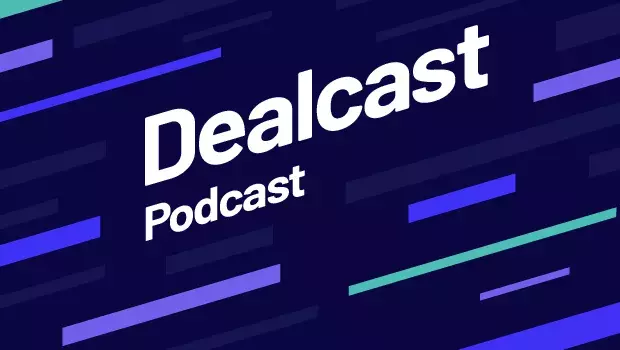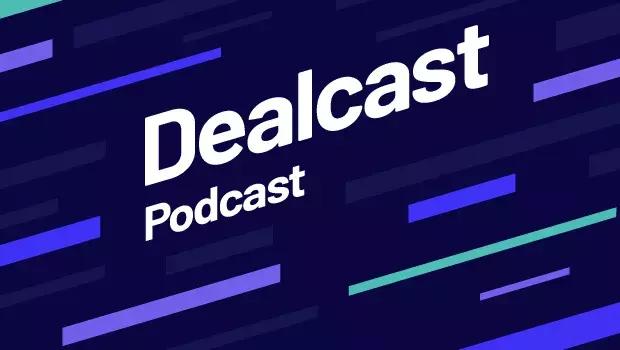Why FDI Screening Is a Hot Topic In EU Member States
In this week’s episode, we delve into the subject of foreign direct investment (FDI) screening in Europe and explore the reasons behind its current prominence as a hot topic. Joining us for this insightful conversation are Jacob Parry, chief regulatory correspondent for PaRR and DealReporter, and Paris-based Arezki Yaïche, head of French coverage for Mergermarket.
Dealcast is presented by Mergermarket and SS&C Intralinks.
Transcript
Hello. And welcome to Dealcast, the weekly M&A podcast, which is presented to you by Mergermarket and SS&C Intralinks. I'm Julie-Anna Needham. I'm a business journalist who's been covering M&A for a decade.
In this episode, we're finding out more about foreign direct investment, or FDI, screening in Europe and why it's such a hot topic at the moment. I'm joined by Jacob Parry, chief regulatory correspondent for Parr and deal reporter who's based in Brussels and Arezki Yaiche, head of French coverage for emerging markets and deal reporter.
[MUSIC PLAYING]
Hi, Jacob. Hi, Arezki. Thanks very much for joining me today.
Hi, Julie-Anna. Thanks for having us.
Thanks for having us.
So can we begin with you explaining briefly please why FDI screening is so high on the agenda in Europe at the moment?
I think it's worth noting that investment screening is not new to EU member states. Some regimes like those in France and Germany have existed for decades. That said, historically the focus was really much on security and defense. And we saw a pretty limited space in which such regimes could really interfere in the dealmaking or even shape the dealmaking process. The key development has been the 2017 EU FDI regulation.
And that's EU regulation.
At the EU level, yes. And then I should also note that while this covers EU member states, it's not just the EU member states who are concerned about inbound investment. The United Kingdom has been particularly hawkish in the past few years as we've seen a number of vetoes.
I think we can think of the Newport wafer fab, the acquisition of that asset by Syria as being one such deal. But I think it just really reflects the growing geopolitical concerns that EU member states and countries like the United Kingdom have in particular when it comes to countries like China.
I think Jacob summed it up very well. But I would add to it the wake up call that the COVID pandemic was. I mean, we saw disruption of the supply chain. And the EU member states scrambled to coordinate on several things on the vaccines and also like securing the supply chain. I mean, also for food safety, especially.
So this shock I think pushed for an acceleration of the implementation of FDI regime in some countries where we had no regime, and in historic countries like France and Germany, where it has been strengthened or heightened to avoid acquisition on the cheap when you saw we saw like decrease in valuation and risk of acquisition hostile acquisitions.
Great. Thank you. And so we're going to look now at some of the countries that have been in the spotlight. Starting with you, Jacob, let's have a look at Germany, the Cosco review.
Cosco is the Chinese shipping company that's taking a minority stake in Hamburg's container terminal. That deal finally ended last month, or the review finally ended last month. Why did it take so long? And why did it prompt such heated debate in Germany?
This deal and the review that the German government conducted has really been a hot rod for controversy ever since the deal was announced. I think there's maybe one key factor here, and it's China's growing influence on marine supply chains. That's really what triggered the German government's concern.
We saw a bit of a preview to this when Cosco took a stake in the Port of Piraeus a few years ago. That was kind of seen as a Warning shot by some of the more hawkish of those in the West who have concerns about China's outbound investment. I think it's also worth noting that there's been reporting that the US government intervened on this transaction and asked that the German government take a hard and fast look at what Cosco was looking to acquire.
I think the last thing that's worth mentioning that's kind of interesting about this deal is that it really split the German government. We had Chancellor Olaf Scholz, who was also the former mayor of Hamburg, quite supportive of the deal. Meanwhile, we had the Ministry of Economic Affairs and Climate, which is controlled by Green Minister Robert Habeck, against the deal. That split resulted in a lot of ink in the German press over the last few months.
We saw an approval back in October 2020 to add a 24.99% stake, a few percentage points less than the parties had initially agreed to. In April this year, there was another revival of the review when it became unclear whether or not the asset fell under the revised guidelines that the Ministry updates every year to figure out what counts as essential infrastructure.
After an intense bout of lobbying, finally a few weeks ago the German government said we've decided to clear this deal, but of course not without some controversy. And we've already seen in the weeks since then a lot of hot rhetoric from the greens, from the Christian Democrats, and also from the FDP who are in coalition with the socialists and the greens, sort of pointing out that this was probably not the best outcome in their perspective.
So it sounds like a bit of a political hot potato. But it's not just Chinese buyers that are facing this scrutiny, is it? Because with the Viessmann Carrier deal-- Viessmann is the German heat pump maker-- that had a US buyer. And that has also drawn significant scrutiny.
Why is that? And is it clear when and where the German government can intervene in a deal?
I think the Viessmann acquisition-- And again this is carrier the global air conditioning giant based in the United States taking up or acquiring Viessmann main business, which is heat pumps.
It was a 12 and 1/2 billion euro transaction. Also worth noting that Viessmann is a proud Metalastan company. It's very much seen as emblematic of the success that medium sized family owned enterprises can have in Germany.
So I think for that reason and the fact that we're talking here about what is really a leading sector in Germany, heat pumps somewhere where Germany is seen is as having a lot of R&D, a lot of innovation, and a lot of political importance as the EU and Germany both look to meet their climate goals in the decades to come. I think for all of those reasons, this emerged as another sort of hot potato.
That said, this is heat pumps. It's not semiconductors. It's not essential infrastructure. We're really talking about something here that would fall traditionally outside of the scope of investment screening. Remember the rationale for most investment screening regimes is really security. How heat pumps connect with security, that is evidently one of the questions that the German government has to decide.
So just in terms of the nuts and bolts of this transactions, the parties proactively approached the German government and notified the transaction. And now we're going to see a review over the coming months. I believe the parties have until mid 2024 to close the deal.
So these reviews can last for some time even if it isn't a not particularly sensitive sector and even if it involves a US buyer. We've seen in different member states us buyers run into trouble or at least very much having to engage in offer commitments on certain transactions. So I think it really shows that no matter where the buyer comes from, no matter the sector, if there is enough political energy or if it touches on enough hot wires, it can ultimately lead to a deal being scrutinized by an EU member state.
Great. Thank you. And could you just briefly outline what's next for Germany's FDI screening regime, please?
Yeah. So it's been an interesting few years as the German government has sought to beef up its tools during the COVID-19 pandemic and also look at more sectors where we see inbound Chinese investment in particular. And I think a key part of that effort has been reviewing and revising its underlying legislation.
It's worth noting that the FDI screening regime in Germany is underpinned by more than one piece of legislation. So we've reported that the German government has the goal of consolidating that legislation hopefully by 2024.
There are going to be some interesting pieces and new aspects to that legislation. In particular, the German government we've reported is considering on whether or not to apply investment screening rules to Greenfield investments. So new investments in a plant or a factory that hitherto did not exist.
They're also looking to address the silent investors, those who fail to respond to the German government's inquiry. And then finally a topic that's emerging a bit at the EU level as well, outbound investment screening controls. So there's been a lot of discourse in particular about the vulnerability that certain German exporters have vis-a-vis China. And I think that has triggered a conversation along with this parallel debate in the United States about investment screening on the extent to which European countries should also be looking at outbound investment screening.
Great. Thank you. And we'll come on to the wider European legislation in a moment. But Arezki, coming to you now and looking at France, France has got one of Europe's oldest investment screening regimes which started back in 1966.
And it's also seen as one of the toughest or the most advanced. Now the Ministry issued its annual report earlier this month. So what does that tell us about France's priorities or concerns in relation to FDI screening?
Yeah. First of all, it's good to have some sort of historic tool I have to say. But yeah, to understand why France has as the oldest regime, as a nuclear power after World War II was just for France to apply FDI screening on defense and security only. And it is until 2014, it was not extended to other sectors. The acquisition of Alstom energy assets by US general electrics in 2014 triggered an extension to other sectors beyond defense and security. That was energy supply, health care, transportation network.
And then in 2019 with the election of Emmanuel Macron in 2017 and his plan to beef up European sovereignty, so also, France economic sovereignty. So it came up with a local pact which was set to free France economic potential with less norms and making France more attractive for foreign investment. And in this law, we had also an extension of the FDI screening to food safety, energy storage, or data protection and data management.
And with the COVID pandemic, the threshold, which was initially set at 33% in 2019 and 25% in 2019, sorry, for foreign investors to be investment from foreign investor to be reviewed. The threshold has been lowered to avoid acquisition on the cheap, because of the situation COVID put us all in.
And so yeah, since then it has never came back to a normal threshold. This threshold has been reduced to lower to 10% for some transaction. So yes indeed, France is the strictest regime, but some French politicians would say also the most advanced, because we are not naive anymore and we want to protect our industry and avoid the supply chain cuts we noticed during the COVID period.
But there is also some sort of discrepancy or paradox with France. The report published last week flagged that France was for the fourth year in a row or third year in a row, the most attractive destination for foreign investment according to a study published by Ernst & Young with 30 billion Euros invested in France. But what this report is not mentioning is they're just focus on volumes but not on jobs creation on value creation.
And the trouble with France-- and many politicians are flagging that throughout Europe not only France-- is that on the one hand, you want to attract more foreign investment, but on the other end, you heighten screening also for Europe and partners. Being the country France pushing for a heightened European sovereignty, it is difficult to take that your FDI regime is also screening European investments.
Because compared to Germany, for instance, which also focused mostly on defense security infrastructure, France is also screening deals in the agricultural space, in the cybersecurity, communication sometimes when it deals with some media, key media. So yeah, there's some sort of paradox with France, a double switch if I can say.
So yeah, this is interesting to see the developments throughout Europe and how the Commission is trying to push for alignment between FDI regimes. But we can see that France as is its on the way of advancing. And yeah, will be interesting to see what will come ahead in Europe.
And Jacob, did he have something to add to that?
I think it's been interesting to see in the past few years, maybe the logic of investment screening start to morph a little bit. In the 2000s and the 2010s, it really was about defense deals. I don't think that any legal advisor would be surprised to see a lot of scrutiny of a deal in a security-sensitive sector.
But now this point about low valuations during the COVID-19 pandemic, that was a real concern. And there's been a lot more scrutiny of deals outside of traditionally sensitive sectors. I think a key one in France that's worth mentioning was the attempt by Couche-tard, a Canadian grocer, gasoline store chain looking to take over Carrefour, which ultimately collapsed before the deal was even announced in part because they knew that they were going to get heavy scrutiny by the French government.
So it's definitely a lot more politicized than it has been in years past. And while I think France stands out in some ways as maybe having the most stringent regime on the continent, I don't think that the underlying dynamics are at all unique to France.
Great. Thank you. And we're running out of time A bit so I would like to ask you to answer the next question briefly if possible. But looking at Europe at large and the EU, we've covered it a little bit in the previous answer. But what's next for the EC's own FDI regulation and the mechanism that it established? You mentioned earlier about outbound screening controls, Jacob.
Right. So there's been a debate since the EU screening mechanism was first adjusted over the extent to which the commission should be able to harmonize or Europeanize the approach across the EU. I think as our examples in France have shown, there's a limit to that given that this is a national competence.
So coming up later this year, we're going to hit the third anniversary of the EU screening mechanism. The commission is due to write a report.
Obviously, they'll be looking at the extent to which different countries have introduced or hardened their regimes. But I think they'll also start to be giving an open mind to what are the next pieces in investment screening? Could we maybe see outbound investment screening controls at the EU level in the same way that the United States is considering?
So I think all said and done, we have seen a lot of developments on investment screening in the past few years. But I think as the European Commission gets set to review its own tools, we're really going to see a lot more in the years to come.
What I can add to that is that this review is happening less than a year.
Yes, yes, it will be less than a year before the next European election. So we may see a lot of political interference since the campaign will be in full swing in early 2024. And the election will happen in June '24, there's a risk to see like many political reforms to push for either a greater European sovereignty, a shared European sovereignty, or maybe questioning a homogeneous system across the block and pushing for just like regimes to stay national.
So that would be very interesting to see what would be the quality of the debate when this review will happen at the European Commission. It's a great job they have. And it's going to be funny to watch and very interesting as well.
Great. Arezki and Jacob, thanks very much.
That was Arezki Yaiche and Jacob Parry. Thanks for listening to Dealcast presented by Mergermarket and SS&C Intralinks. Please rate, review, and follow the podcast. You'll find us on Apple podcasts, Spotify, or look out for your Mergermarket news alert. For more information, have a look at our show notes. Join us again next week.
[MUSIC PLAYING]




